Hal Draper (1914-1990) is known as an advocate of “socialism from below” from such works as “The Two Souls of Socialism” and Karl Marx’s Theory of Revolution. In the early 1940s, he also helped to found the “third camp” tradition of socialism, which rejected both the capitalism of the West and the Stalinist system of the Soviet Union. Third camp socialists agreed that the early promise of a socialist society after the Russian Revolution had been overtaken by the rise of a new exploiting class.
In the U.S., Draper, Max Shachtman and others characterized the new class system as “bureaucratic collectivist,” while their comrades C.L.R. James and Raya Dunayevskaya referred to it as “state capitalist” (Tony Cliff in Britain called it “bureaucratic state capitalist”). The same labels would apply to the Communist states set up by the USSR in Eastern Europe following World War II and to states organized in a similar way, such as Mao’s China.
The third-camp socialist slogan, “Neither Washington nor Moscow,” expressed their view that the Cold War was an inter-imperial conflict. This view, in turn, helped frame their approaches to the national liberation movements that arose in the Cold War context. From the 1940s into the 1960s, third camp socialists in the U.S. sometimes organized under the banner of “Independent Socialism.” By 1964, Draper was a librarian at the University of California/Berkeley, where he helped found the student Independent Socialist Club (ISC). The ISC would play a leading role in Berkeley’s Free Speech Movement and the anti-Vietnam War movement.
Samuel Farber, who belonged to the ISC, is preparing a collection of Draper’s writings for Haymarket Books, which will include “The ABC of national liberation,” first published in 1969. Farber introduction, below, is excerpted with minor edits from that collection.
Samuel Farber’s introduction
This article was of great importance in the political education of the members of the Berkeley ISC as well as my own. Although written as a pedagogical primer for young socialist students, it was not less brilliant and original in its analyses. As a political group that, under the leadership of Hal Draper, was of course for the immediate withdrawal of U.S. troops from Vietnam (as well as everywhere else for that matter), the issue also arose—as will almost inevitably arise in most struggles for national liberation struggles—of what attitude American revolutionary socialists should adopt towards the specific political groups that are leading the struggle in the countries subject to U.S. domination. This was a particularly vexing problem in the case of Vietnam in light of the great political power and influence exerted by Communist North Vietnam and the National Liberation Front (NLF), its South Vietnamese branch and ally—keeping in mind once again that as soon as they took power they would establish a top-down and thoroughly undemocratic one party state (as indeed happened after the victory over the U.S.), thereby preventing the independent organization of workers and other oppressed groups.
That is why Hal Draper had shown a great deal of interest in the Buddhist-led revolts that occurred in Vietnam in the fifties and sixties (in articles to be included in the Haymarket collection). This political development in Vietnam should not be surprising, since, as has happened in numerous cases elsewhere, authentic mass rebellions have often been organized by leaders whose ideologies have been framed in religious terms.
However, the Vietnamese Tet offensive in 1968 demonstrated to Draper that the NLF had the overwhelming support (or at least acquiescence) of the great majority of the Vietnamese people and that the Communist-led NLF was the only organized alternative left to defeat US imperialism. In response to the new situation, Draper came out in this document not only for the immediate withdrawal of U.S. troops (that was of course never in question) but also for a political perspective favoring the military victory of the NLF.
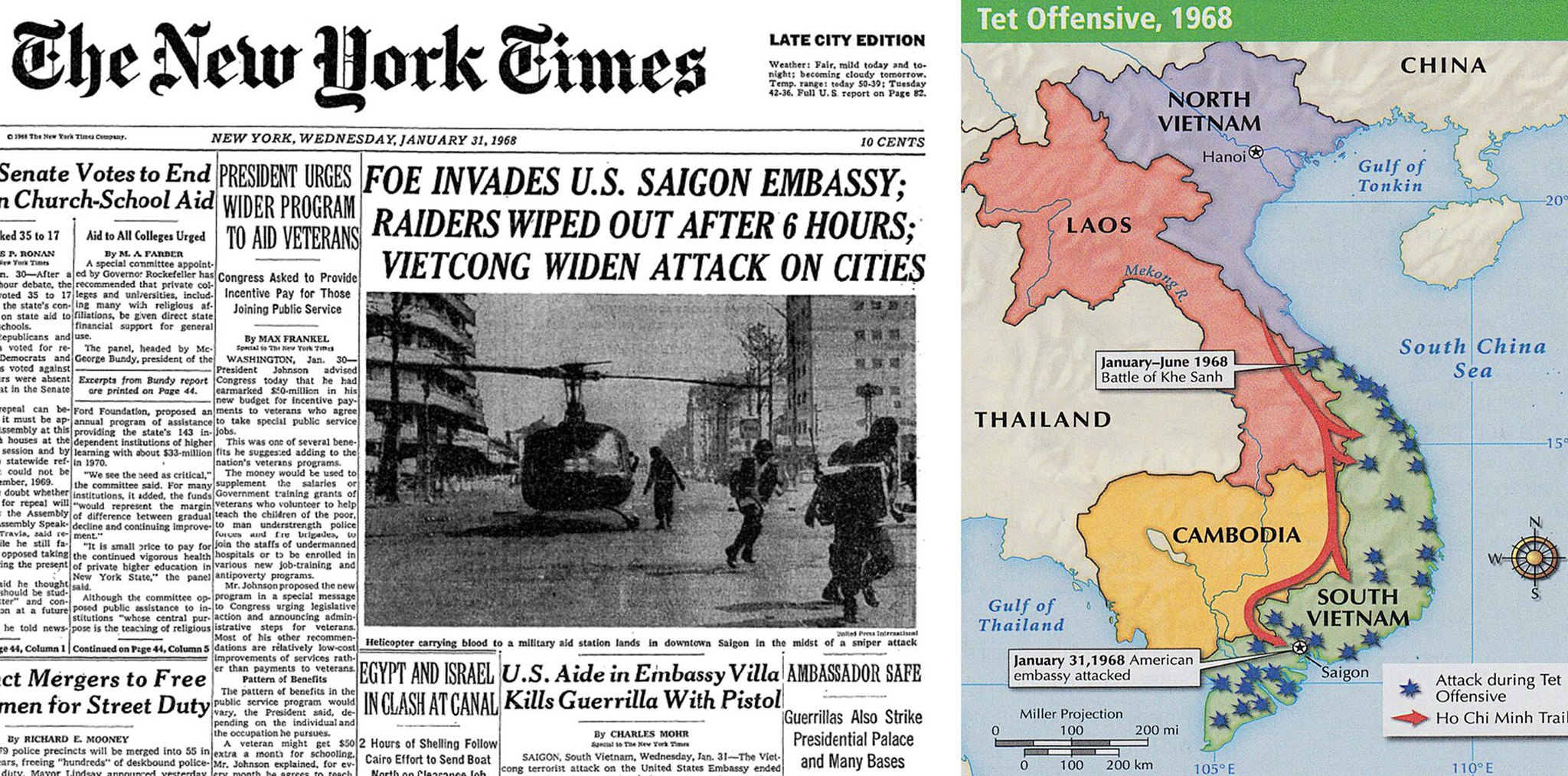
What I found especially valuable and highly educational about this article is that Draper presented, beyond analyzing the new situation in Vietnam, a whole methodology to guide the ISC and more broadly the left, on how to decide what stand to take regarding a wide variety of political situations, involving not only national liberation movements, but more broadly international conflicts including wars, which, following the strategist Carl Von Clausewitz and the Marxist tradition, Draper defined as the continuation of politics by other means. Draper’s analysis in this article addressed such widely different cases as the clash between China and Japan during World War II, Ethiopia’s resistance to Italian imperialism and the Spanish Civil War in the 1930s, the Algerian struggle for independence in the fifties and sixties, the conflict between Stalin and Tito’s Yugoslavia in the late forties and early fifties, and the U.S.-sponsored invasion of Cuba in 1961.
Draper’s approach continues to be very useful today in understanding and reaching political conclusions from a democratic and revolutionary socialist perspective regarding such diverse places and conflicts such as Ukraine, Syria, Hong Kong, and Iran. These issues have been brought to the fore by the widespread Left political phenomenon of “campism,” meaning the uncritical political support that many on the left give to any country and movement that opposes U.S. imperialism no matter how reactionary and anti-democratic that regime or movement might be.
Hal Draper’s introductory note
This document—a political discussion guide—was written for the members of the Independent Socialist Club of Berkeley when the Vietnam War seemed to take a new turn, with the Tet offensive of 1968 launched by the National Liberation Front. For the Independent Socialists, the turn did not entail a different attitude toward the United States’ intervention as world overlord of the capitalist bloc. The club had long been in the forefront of the anti-Vietnamese War movement in Berkeley.
In my opinion, what the Tet offensive showed, with no possibility of doubt any longer, was that the war in Vietnam was not primarily a civil war between two Vietnamese sides, one of which (the old reactionary side) was being supported by the imported arms of the Western imperialists. The Tet offensive showed conclusively that the overwhelming majority of the Vietnamese supported the NLF either actively or passively. The document below explains how this makes a difference, and what difference it makes—not to the question of support to the American intervention, but to one’s interpretation of the role of the NLF.
Besides, even aside from this factor, there was a need for educational analysis of a number of issues associated with national liberation movements in general. Many of the members of the Independent Socialist Club were young people who had never before faced complicated problems of socialist policy; this antiwar movement was the first time they had been brought up against such needs. The Independent Socialists were outstanding in combining the most militant opposition to the American government in the war together with a refusal to glorify the NLF and its leader Ho Chi Minh. This required a good deal of thinking through on their part, as distinct from chanting paeans of praise to the political force that was going to totalitarianize Vietnamese society if it won.
This “political guide” was designed for study and discussion. It was written in the form of (to use socialist jargon), a “set of theses.” The point about “theses” is to state, in as clear and unambiguous a manner as possible, a position on a more or less complicated question. The aim of “theses” is not necessarily to prove a case, but primarily to state it in unmistakable terms. The young socialists of the club had heard many things about socialist policy in national liberation situations: The idea was to try to put it all together.
1. Anti-imperialism and revolution
As revolutionary socialists in the U.S., our immediate enemy is American capitalism and its imperialism; and we wish to fight American capitalism at home and American imperialism abroad by every available means.
At bottom this is a single fight, since any weakening of American imperialism abroad or defeat suffered by it abroad also weakens the domestic capitalist power structure and facilitates opposition at home. The same is also true for other imperialist states, since a weakening or defeat of one or another power reverberates through the interconnected structure of world imperialism.
If an armed struggle is decisively a continuation of resistance to imperialist oppression, then it is decisively a war of national liberation that deserves the support of revolutionary socialists.
Therefore, objectively, anti-imperialist struggle by any people is an aid to the forces of revolutionary change at home.
But a warning is necessary: That word “objectively” represents a famous pitfall.
- It is one thing to analyze and understand the objective effect of an event, and quite another thing to leap to the conclusion that we therefore advocate it or support it. We do not advocate depression, war or super-exploitation on the ground that they stimulate revolution.
- An event may have more than one objective effect; this is a risky way of arriving at a policy. In our present world, specific victories by American imperialism may have the objective effect of weakening Communist imperialism, and vice versa; but as an enemy of both, we do not find this an adequate basis for deciding policy. It is one consideration, to be taken in context. There is no substitute for concreteness.
Whenever anti-imperialist resistance breaks out into armed struggle, our attitude toward that war is based on the same fundamental consideration as our attitude on any other war, viz.: A war is politics continued by other, that is forcible, means. Our attitude toward a war must be congruent with our attitude toward the politics of which it is the continuation. This determines our principled position on the question of whether to support or oppose a given war—not primarily our opinion of the men, the government or the class leading the war, not our opinion of their past or present crimes. The latter considerations will be very relevant to how we support or oppose a war, but not to whether we do.
If an armed struggle is decisively a continuation of resistance to imperialist oppression, then it is decisively a war of national liberation that deserves the support of revolutionary socialists.
2. National elements and imperialist elements
It is true that a particular national struggle can be swallowed up in, and overshadowed by, a more all-embracing conflict of an imperialist character, so that it is impossible to support any side of the national struggle without supporting one or another side in the general war.
The…context of imperialist antagonism (Cold War) is inevitably reflected in almost any conceivable local conflict, and may give rise to imperialist elements in any local situation, but it does not…necessarily determine the character of that local conflict.
The case of Serbia. Such a case, in fact, was seen at the very beginning of World War I, which was triggered by the national struggle of the Serbs against the Hapsburg Empire.
If that conflict had remained on the ground of the antagonism between the Serbian people and its imperialist oppressor, revolutionary socialists would have been pro-war, i.e., pro the national war of the Serbs. But in fact the Serbian struggle was completely integrated into the Allied camp; and this national element in a predominantly imperialist was therefore outweighed.
The case of Spain. A different case was exemplified by the Spanish Civil War. (We are not citing it as a war of national liberation; we wish to make a point common to both civil wars and wars of national liberation.)
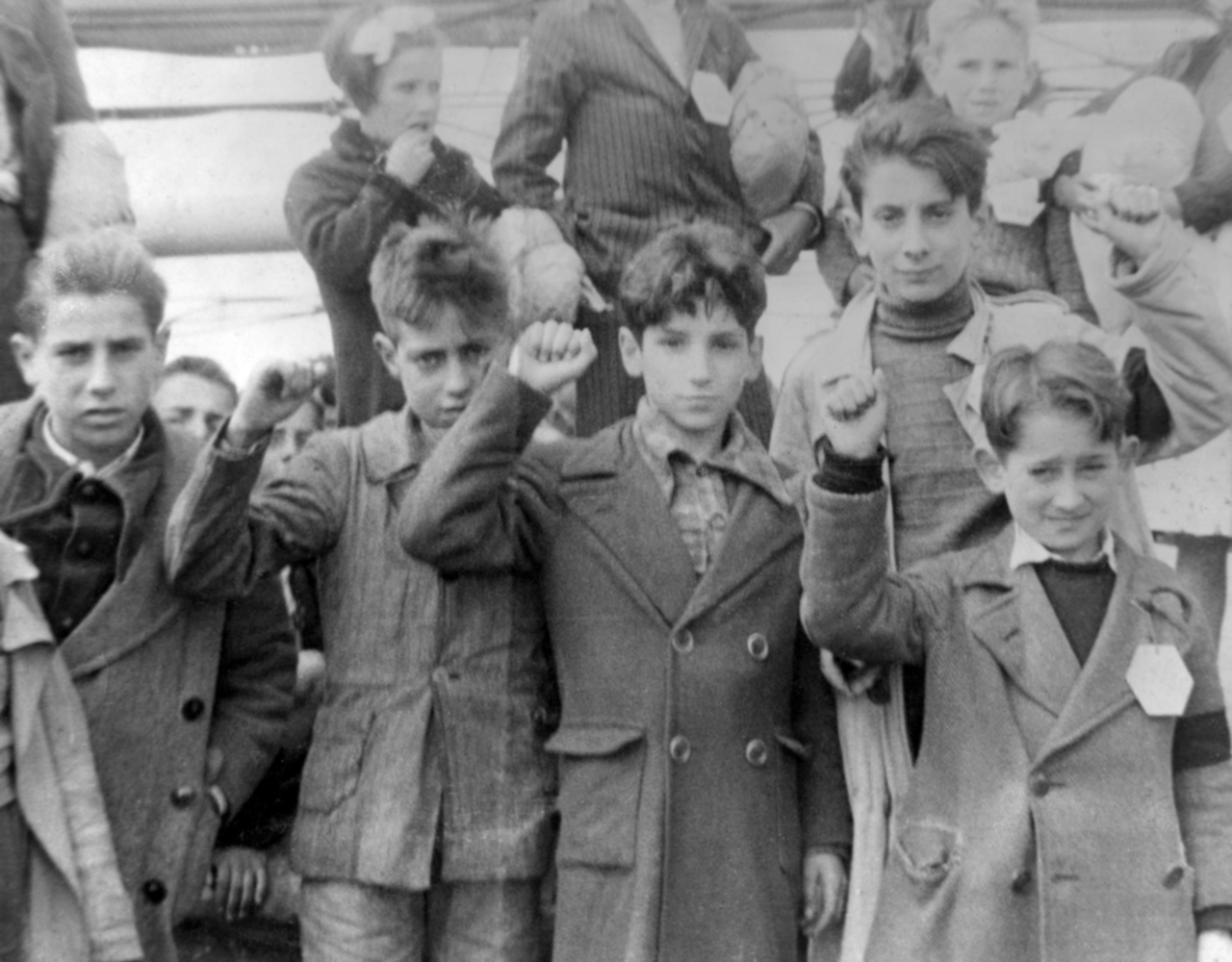
In the case of Spain, Marxists supported the military defence of the loyalist regime, since in their view this civil war was decisively a continuation of the politics of the defence of the democratic republic against a fascist assault—that is, it was really a conflict between democracy and fascism, not demagogically so, like the previous war [World War I] to “make the world safe for democracy.” While other aspects of policy will be considered later, we point out here that it was clear in Spain there was an international imperialist element in this conflict. German and Italian military units even fought on Franco’s side; foreign socialists and Communists organized to fight on the loyalist side; Russia intervened non-militarily on a large scale; a web of diplomatic imperialist maneuvering went on around the tragic situation. In fact, the Spanish war was a localized hot war in the midst of an international imperialist Cold War. It was quite possible that World War II could have been triggered off by it, and this eventuality would have completely overshadowed and changed the character of the local war, as in the case of Serbia. But it did not, and this remained only a potentiality, not a fact; and therefore the Marxists’ attitude of military support did not have to change.
The conclusion is: The existence of an international context of imperialist antagonism (Cold War) is inevitably reflected in almost any conceivable local conflict, and may give rise to imperialist elements in any local situation, but it does not thereby necessarily determine the character of that local conflict.
3. Why socialists support national liberation
How does support to a war of national liberation relate to the basic politics of revolutionary socialism? In two ways:
- The first restates the point we have just made about our basic approach: the politics of which war is a continuation. We support a struggle for a national liberation or independence because this national aim is a democratic demand.
We are for all genuinely democratic demands—for the same reason we are for socialist demands and aims: because their fulfilment is necessary for a world in which human potentialities can best flower. National self-determination is a democratic demand even if it means self-determination under an undemocratic national government, as it often has. We should support this democratic demand even if it were unrelated to the further struggle for socialist democracy. - But, as a matter of fact, it is very difficult if not impossible for any genuinely democratic demand to be unrelated to the struggle for socialism, because of the nature of socialism itself. National liberation (independence) facilitates the struggle for socialist democracy, if not immediately then in a later stage.
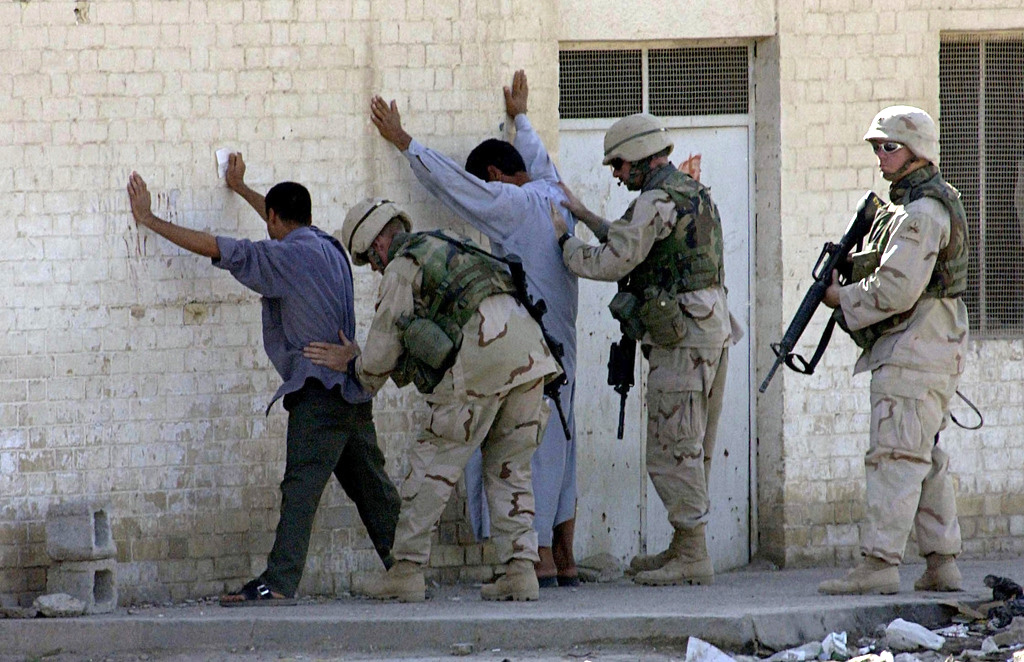
The essential reason is this: Domination or oppression from the outside by a foreign imperialist tends to overlay the social struggle (class struggle) of the indigenous society, and therefore to distort, dampen or moderate precisely those social antagonisms which bear a social revolutionary potential. A people who do not enjoy national freedom will tend to [pay] primary attention to that immediate source of pain; their capacity to struggle will tend to be dominated by it; their perception of who-is-the-enemy will tend to be dominated by it. Therefore imperialist oppression tends to set back or slow up a full crystallization and clarification of class antagonisms; and a liberation from imperialist domination will have the long run effect of providing the conditions for the exacerbation of internal class strains (even if the immediate effect of a national liberation victory appears to be otherwise for an initial period). This is not gainsaid by the fact that, to be sure, revolutionary policy aims to introduce class struggle components even in the course of a national struggle.
Here, as in other sectors of politics, the fight for democracy includes specifically the democratic demand for national liberation.
4. Military support and political support
Besides the question of whether to support a given war, it is vital to be clear on how revolutionary socialists support a war. A distinctive feature of the Marxist approach is the distinction between military support of a given armed struggle and political support to a given political organization (including a government) which may be officially “in charge” of that armed struggle.
This pregnant distinction goes far back in the Marxist movement, perhaps the first prominent example being Bebel and Liebknecht’s refusal to vote for war funds for the Franco-Prussian war. It has never been more important than today.
For most people, including liberals, social democrats and opportunists of every stripe, “support” means support, period. For Marxists, it never has. This is one reason why, not infrequently, political leaders of a national struggle have been almost as unhappy about being supported by revolutionists as by being opposed. Typically, the official leaders demand “civil peace” below in the ranks of their supporters, by which they mean unquestioning acceptance of their own dominance; they call for the end of “partisan politics,” by which they mean they want unquestioning support of their own partisan politics.
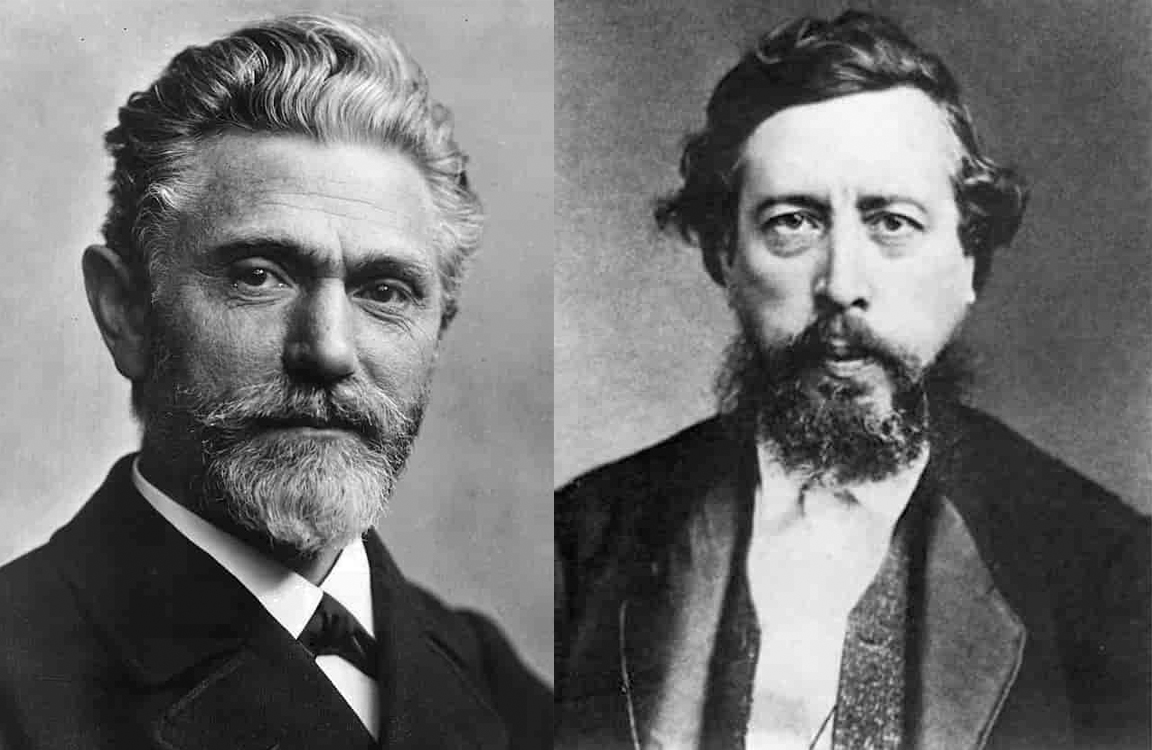
But Marxists see no more reason to give political support—to a government, to a party, or to any other political organization—in wartime than in peacetime, and do not believe that basic differences in social policy become irrelevant just because policy is to be carried out by arms rather than by “normal” means.
On the contrary, it is precisely basic (especially, class) differences in social policy which may make the difference between victory or defeat in the armed struggle itself (as in the Spanish case), or may determine just what it is that is won and who does the winning, after victory is achieved.
5. Six cases
Let us take three pairs of cases to illustrate some problems of military and political support, especially in national wars.
(1:A) The case of Chiang Kai Shek vs. Japan
This refers to the period before World War II when Japanese imperialism was carrying on a blatantly aggressive policy, grabbing Manchuria and threatening to take over all China.
At the head of the Chinese resistance government was, officially, Chiang Kai Shek and his Guomindang—who, not long before, had distinguished themselves by their counter revolutionary fury in a bloodthirsty suppression of the working class in the cities. Internationally, socialists (and others) gave military support to the Chiang regime as against the Japanese invaders—even Chinese revolutionaries who simultaneously had to defend themselves more against Chiang’s butchers than against the Japanese. And this, for a regime (Chiang’s) which could not be said to represent a bourgeois democratic social force, being not very bourgeois and even less democratic.
(1:B) The case of Ethiopia vs. Italy
Mussolini’s openly imperialist attack on the realm of Haile Selassie was a similar case. The society ruled by the Negus was an incredibly reactionary one (not capitalist reaction but pre-capitalist reaction)—real slavery being by no means its most objectionable feature. In comparison, even Fascist Italy was a more progressive society, it goes without saying. Yet socialists gave unquestioned support to the defence of Ethiopia against this “more progressive society,” and even the Communists were embarrassed by Russia’s treacherous sale of badly needed oil to Mussolini’s war machine.
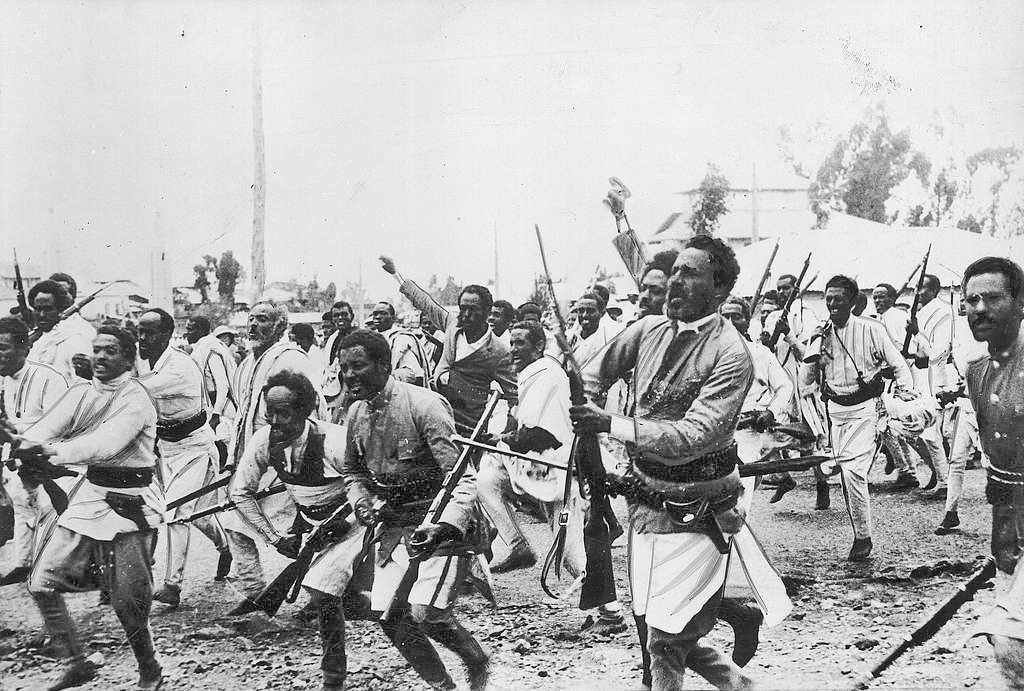
Why the support? Ethiopian society was so reactionary that not everything we have said about the reasons for supporting national wars can possibly apply. Most particularly, a victorious defence by Ethiopia could hardly be expected to be very relevant to “facilitating social revolution” in that country; in fact, a case could be made that Italian conquest would probably create revolutionary elements in Ethiopia more quickly.
The essential justification must be sought in two statements:
- The national freedom of Ethiopia was a democratic demand, as already explained; and
- A successful conquest of Ethiopia by Mussolini would have had a definitely retrogressive meaning for the social struggle in Italy, by helping to consolidate fascism internally, with a derivative similar effect elsewhere in Europe.
(2:A) The Spanish Civil War
We are here interested in the difference between military and political support in this situation.
Revolutionary socialists could not give political support to the bourgeois republican government which had been attacked by Franco.
This republican government had itself brutally shot down militant workers only the day before yesterday. Moreover, it was an imperialist government, so much so that not even the need to win over Franco’s Moorish troops, in order to save its own neck, was enough to get it to declare for freeing Morocco. Revolutionary socialists could have no confidence in the conduct of the war by the section of the republican bourgeoisie which had not gone over to Franco, not even confidence in their will to fight Franco to the end, and certainly no confidence in their ability to fight Franco by the only means that could win, revolutionary means. When, in a later stage, due to Russian pressure exercised through material aid, Communist Party influence in the government became strong, to the point where the Spanish section of the GPU even had its own jails, the government apparatus was indeed used to silence and murder revolutionary opponents.
The military support to the struggle by the revolutionary left took the form of building independent fighting forces (the anarchist columns and POUM battalions), under their own command, while collaborating militarily with the forces of the government.
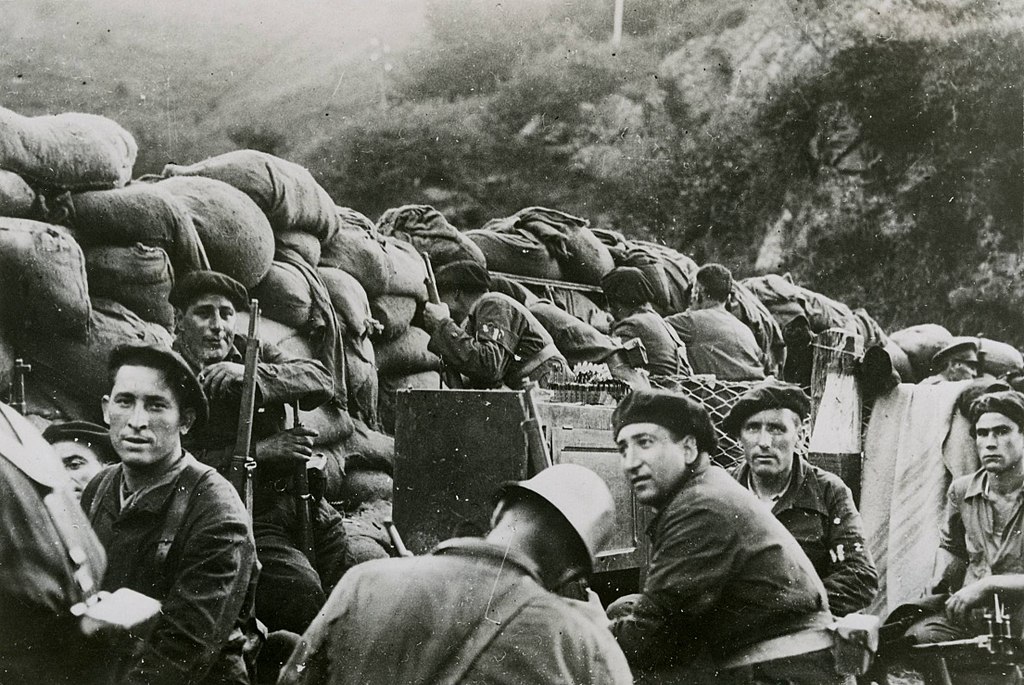
The existence of these independent armed forces of the left represented the possibility of an alternative leadership for the struggle as a whole; it reflected a basically different aim in the struggle itself (carrying over the struggle against Franco to social revolution, not a return to the discredited bourgeois status quo ante). The counter-revolutionary character of the Loyalist government and its Communist allies was acted out when they turned on the independent Left forces in a bloody suppression. This was a prelude to the defeat of the Loyalist forces themselves by Franco, since only social revolution could have defeated fascism in Spain.
In Spain, therefore, we see that military support of one camp in the war did not exclude the formation of independent armed forces to carry on the military struggle without subordinating it to the political control of the “official” leadership of the Loyalist camp. Similarly, outside of Spain, revolutionary socialists who sympathized with the Left sent their material aid not to agencies of the official government but rather attempted to channel it as much as possible to the independent detachments, without opposing other efforts which were organized to send material aid to the Loyalist government.
(2:B) The Case of Algeria
There was no question but that revolutionary socialists supported the struggle of the Algerian people to free themselves from French imperialism. But for several years, the situation was characterized by the fact that there were two fighting movements of Algerian national liberation, neither of them “official”: the FLN and the MNA. Supporters of Algerian liberation then had to choose between supporting one or the other (or both). Here military support automatically posed a problem in political support.
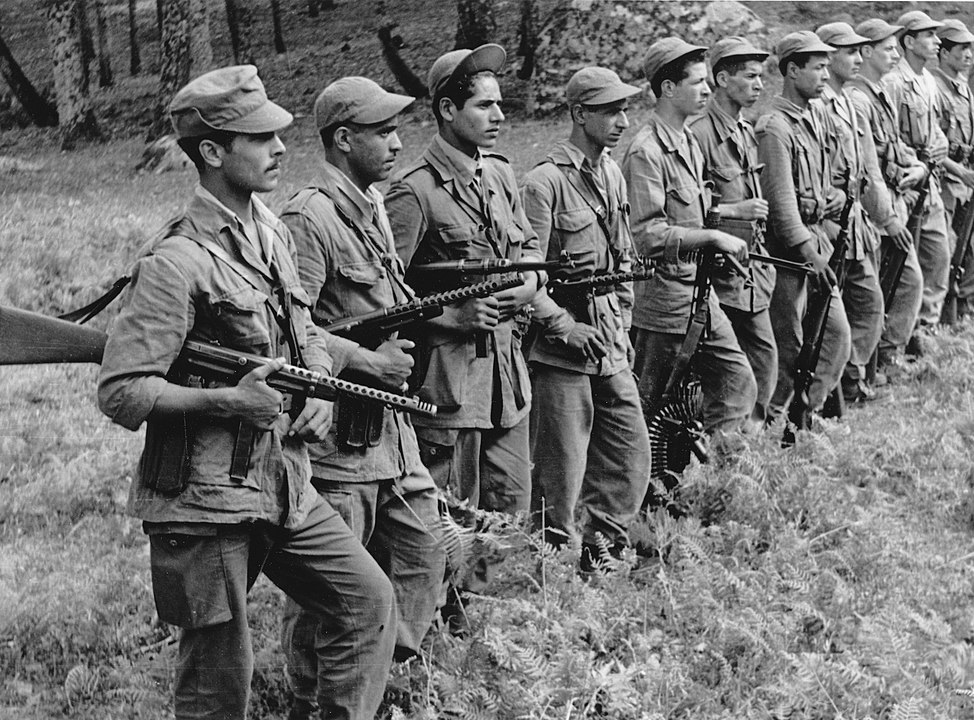
Here too, as in Spain, there was an element of Communist influence in the picture, since the Communists backed the FLN and influenced its operations, though the leadership of the FLN was not derived from the Communist movement. Here too terrorism and assassination was used by one movement (the FLN) against the other. As we know, the FLN succeeded in eliminating its rival for hegemony in the national liberation movement, and, after victory, established the new Algerian government. We believe that Marxists would have to be a revolutionary democratic opposition to that government, not its political supporters. The new government’s politics were a continuation of its war (by other means). Political support to the FLN was by no means indicated merely by military support to the Algerian struggle for national liberation.
In this case, as in the case of Spain, there was a choice of political sides offered concretely, and therefore also a choice of how to give military support—through what political channels.
(3:A) Tito vs. Russia in 1948
We now come to two cases of a considerably different sort. In both cases the political power inviting support is a Communist government.
The first case of this new type was the situation created in 1948 when Tito’s Yugoslavia broke with Moscow and set out on an independent national-Communist course.
There was widespread expectation that Russia would invade the country militarily to force it into line (as it did later in Hungary); there is every reason to believe that this was a real possibility, even though it never actually happened. It was necessary for socialists to be clear in their own midst what their attitude would be in the event of such a war—which would clearly be a continuation of Yugoslavia’s move for national independence from Russia.
Independent Socialists stated promptly, at the time, that they would be for the military defense of Yugoslavia against such a Russian invasion. It goes without saying that there could be no question of political support to the Tito regime.
Nor, for that matter, could the Tito regime be expected to tolerate any independent forces within its borders even in support of its struggle; in time of war crisis, an independent force would be even more dangerous to its totalitarian control than before. If such a war had actually broken out, it is possible that its control would have loosened perforce and in spite of its aims, but this is speculative. In any case, military support of the Yugoslavian fight for national independence would not be conditioned on such development.
Why was military support to the Tito regime mandatory in this case? For all the reasons given above, but one of them must now be restated. This is the motivation which said: “National liberation facilitates the struggle for socialist democracy, if not immediately then in a later stage.” In what sense would victory for the Tito regime in such a war have facilitated the necessary “second revolution” in Yugoslavia? Not necessarily in the sense that the national war would itself merge into a social war, or immediately open the door to it. But certainly in this sense: that the other outcome, conquest by Russia, would mean the overlaying of the internal social antagonisms by the national question, and tend to blanket the former by the latter, thus delaying the reckoning.
What this means concretely was seen eight years later in Poland (1956) when an incipient national and social revolution combined was short circuited by Gomulka, essentially through the strategy of counterposing the national question to the social. A nationally independent Poland at that point would have lain open to social revolution.
History cannot guarantee when the “later stage” will arrive, but we know from all experience that the weight of national oppression is a weight that militates against the resolving of the social struggle by revolutionary means; and that this is fully as true of the bureaucratic collectivist regimes as of the capitalist.
In addition, we must insist that national independence is a democratic demand for countries under Communist rule, not less than for countries under the rule of feudal emperors and Guomindang butchers.
(3:B) The case of the Cuban invasion
Whereas the danger in 1948 was the invasion of one Communist state by another Communist state, in 1961 we saw a Communist dominated state, Castro’s, under the gun of an invasion sponsored by, and effectively organized under the aegis of, American imperialism. In point of fact the struggle was a brief one, since the U.S. pulled back after initial defeat, but it would be useful to consider this case as it would have been if the fighting had gone on for a period of time, in order to underline the problems of policy.
The right of Cuba (or any other country) to self-determination has absolutely nothing to do with whether we or anyone else approve of its government.
American revolutionary socialists were duty-bound to condemn, and wish for the defeat of, the U.S. invasion of Cuba. Any vacillation or uncertainty on this point can only be regarded as a fundamental concession to the ideology of social patriotism.
We must especially reject the reasoning which makes the pervasive U.S.-Russian Cold War the political determinant of the character of this 1961 conflict, that is, which makes it only a subordinate incident in the U.S.-Russian confrontation. This line of reasoning would wipe out almost any case of self-determination in the modern world—for example, the CIA-sponsored invasion of Guatemala in 1954 no less than the 1961 Cuban invasion. It has far less of a leg to stand on than the similar sectarian view which refused to support the Loyalist camp in Spain on the ground that the civil war was only the first battle of World War II; for there actually were substantial foreign troops in Spain, whereas there was no Russian military force in Cuba whatsoever. The decisive political criterion must still be: concretely, what politics was this war the continuation of?
The right of Cuba (or any other country) to self-determination has absolutely nothing to do with whether we or anyone else approve of its government. This is, as we said, a democratic demand even under an undemocratic government. We would like to, see the Castro regime overthrown by the Cuban people in favour of a regime of socialist democracy, but this task cannot be contracted out to American imperialism, which is interested only in installing a regime subservient to world capitalism.
The conquest of Cuba by the U.S. would only have served to confirm American imperialism in its conviction that it not only has the right to police the world in favour of capitalism, but that it can do so successfully and with impunity; and this conviction could only lead to more and more extensive “police actions” of the Vietnam type. The consequence of this development could only be increased reaction at home—that is, if the U.S. succeeded in getting away with it.
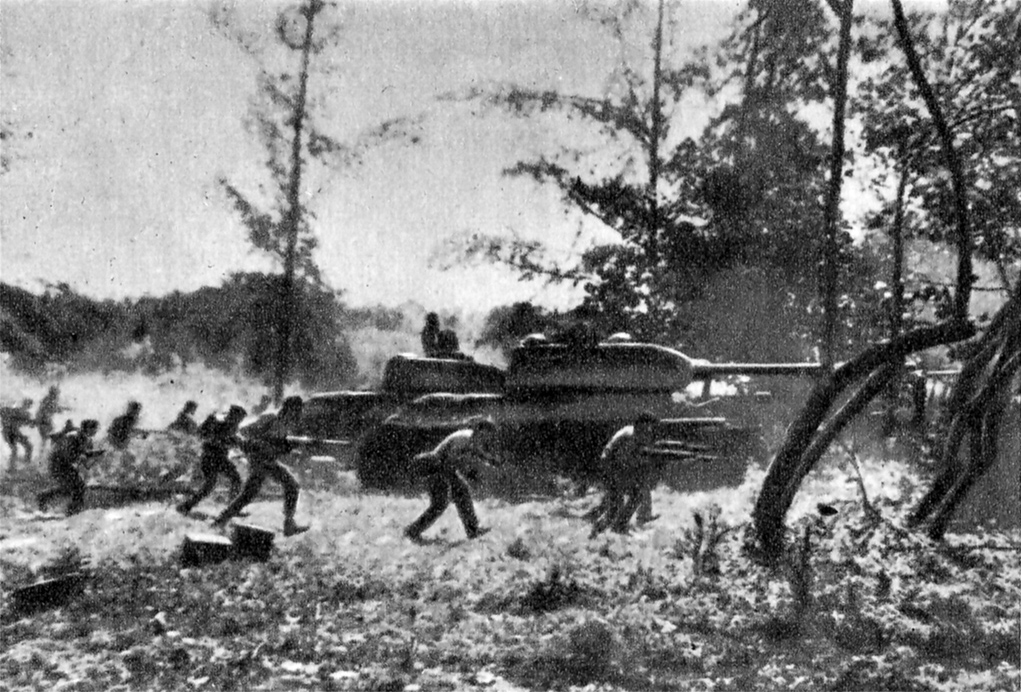
Finally, in the case of Cuba as in the case of Tito, national independence “facilitates the struggle for socialist democracy, if not immediately then in a later stage.” Conquest by the U.S. would not have convinced the Cuban people that Castro was a totalitarian dictator, but rather would have made him their national revolutionary hero defending Cuban integrity against the American colossus. This is exactly the pattern of how Ho Chi Minh captured the status of national hero of the Vietnamese people in the struggle against the French.
The struggle in Cuba for revolutionary democracy under socialism must take place under conditions of independence if it is to develop in a “later stage”; it can only be set back by U.S. domination. Even after the failure of the U.S. invasion and still today, the Castro regime uses the danger and fear of the U.S. intervention to promote support from the people on patriotic grounds.
We were and are therefore in favour of military support of the Castro regime against U.S. invasion, but, as before, this provides no reason whatsoever to convince us to give Castro political support, any more than we do now. We remain political opponents of the Castro dictatorship.
6. A Summary of policy
Political support to an organization or movement or government (which means, its leadership) [in] political power [is] the equivalent of voting for this leadership if an election were to take place.
Political support to an organization or government heading a national struggle is essentially determined by the same considerations as if there were an unarmed political struggle going on (as there may have been before the armed phase of the struggle broke out). We cannot take an attitude of political opposition in the earlier phase and then switch to political support simply because the political war has been continued by other means.
Political support to an organization or movement or government…[is] the equivalent of voting for [its] leadership if an election were to take place.
We do not give political support simply because an organization or government demonstrates it has mass support. We do not give political support simply because an organization or government is an enemy of our enemy. We certainly do not give political support to a government simply because it is in power or gets into power. We do not give political support to a movement or government simply because it adopts a formal political program that is superficially unobjectionable. We do not give political support to a movement simply because it succeeds in inveigling the support of better political elements than its leadership. We can give political support only on the basis of what we analyze as the real political character and real political program this formation, as in any other case.
7. Military support
Military support means that we prefer the military victory of one side in an armed struggle and the military defeat of the opposing side. This is as much a political position as is an attitude of political support, that is, it is determined by political considerations, not military ones. We have already summarized what those political causes are, and have applied them to various cases, where we prefer the military victory of a camp which we do not support politically.
Since the question of military support is a question of a political position, it raises the issue of how to give military support and to whom—that is, the implementing question of the forms of material support. It goes without saying that not every political position we take can be implemented at the time. Even though we frequently cannot implement political positions we take (as when we say we are for a labour party), the point of taking them is propagandistic, rather than a matter of agitation or action.
With respect to the implementation of military support, a major role is obviously played not simply by our attitude but by theirs, that is, the leadership of the national struggle in question. Is that national struggle led by a national democratic movement of some sort, or by nationalist authoritarian or totalitarian leaders?
A simple example: Are the leaders of that nationalist struggle as anxious to kill you as they are to kill the imperialist enemy? In most of the six cases we considered, it was in fact impossible for revolutionary forces to establish a relationship of peaceful coexistence and collaboration with the official leaders of the national struggle, and in some cases the latter would give higher priority to the task of physical extermination of a revolutionary alternative to their own leadership than to fighting the common foe.
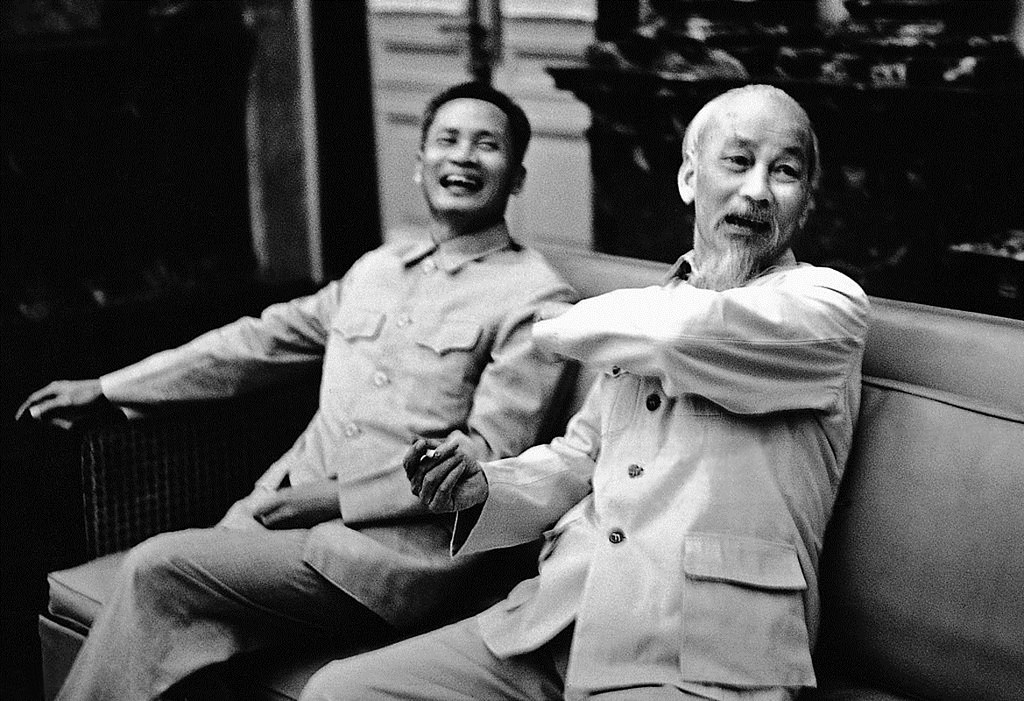
This means it is impossible for the revolutionary to openly establish an independent fighting force to carry on military struggle, or that this can be done only in areas not controlled by the official leadership. Depending on the politics of the situation, “military support” may remain mainly a matter of a political position if there is no way to implement it without handing the revolutionary Left over to the hangmen.
8. Three situations
The concretization of military support is conditioned by which of the three types of situation exists with relation to the scene of the actual struggle:
- A movement in the oppressed country.
- A movement in the oppressor country, or in an ally of the oppressor.
- A movement in an uninvolved country.
It is only in situation A that revolutionary socialists concretely face the tactical problem of whether or not, and in what form, it is feasible to organize military support through independent forces, legal or illegal.
In situation B—a typical one for American revolutionists—we primarily have the task of politically implementing the position of defeatism which is the other side of the coin of military support of the national liberation struggle.
In both B and C, revolutionary socialists will try to determine whether it is possible or desirable to give material aid to any particular fighting force in the situation, and how to do so. But the primary import of military support is likely to be the way it conditions the movement’s political propaganda.
9. The Vietnam combination
The Vietnamese situation in its development represented a combination of two types of situation: a civil war, and an imperialist intervention.
As we saw, there was something of such a combination before; in the Spanish Civil War, we said, there was also an element of imperialist intervention; but the attitude of revolutionary socialists on the Spanish Civil War was decisively determined by the civil war character, not the other element, which remained subordinate. In the Algerian struggle against French imperialism, there was also a civil war element, but neither side of this civil war (FLN and MNA) was in power or tied up with the imperialist intervention.
The combination of these two elements in Vietnam has been sui generis and requires unique analysis.
10. The Civil war element
If we go back to the point following the expulsion of the French, we find a situation which is plain enough (from the viewpoint of our present problem): an indigenous government in South Vietnam, under Bao Dai and then Ngo Dinh Diem, which, while manipulated into power by and supported by American imperialism has a base of support in all the socially reactionary sectors of the society and is faced with a mass revolutionary threat from within and below.
In 1956, the revolutionary threat materializes with an upsurge of Revolutionary Committees which brings South Vietnam to the brink of a social overturn. At this point, there is no doubt that socialists stand for the political victory of this revolutionary movement (critical political support), though its victory would immediately divide it into a right and left wing. But Diem succeeds in beating back this upsurge, and then of carrying out a reign of intimidation and terror which drives many of the revolutionary elements in the direction of the Communists, and provides part of the context for the rise of the NLF under Communist leadership but with the support of non-Communists.
At this stage, the situation is decisively that of an internal social struggle, going over to civil war as the NLF-Communist leadership mobilizes enemies of the Diem dictatorship to form its fighting cadres. In a third corner are still amorphously organized enemies of the Diem regime who resist being pushed into the arms of the Communists, of which we know best the militant Buddhist wing.
As the armed struggle starts between the Saigon government on the one hand and the NLF-Communist leadership on the other, what we have is a civil war. It is a civil war between two reactionary political forces.
On the one hand is the government of the landlord-usurer-comprador-militarist clique of authoritarians, which accepts the role of client of American imperialism but insists on its autonomous rights to carry on its own retrogressive and oppressive social policies even though these embarrass U.S. public relations.
On the other hand is an opposition which is decisively led and controlled by the Communist party—a fact which is not changed politically no matter how many well-intentioned non-Communists are pushed into its ranks by revulsion against Saigon, and no matter how many figure head positions are given to non-Communist fronts.
We know the real political and social program of this Communist leadership as identical with the one already established in North Vietnam, or for that matter in China, allowing for differences in stages in the consolidation of bureaucratic collectivism. We know that this is the same leadership, essentially, as that which made sure to murder revolutionary opponents in the past (e.g. organized systematic assassination of Trotskyists) before even fighting the French or collaborators. We know that in their order of priorities, they are sooner amenable to making a deal with imperialists than to pursuing collaboration with revolutionary socialists; that for them accommodation with imperialism is a lesser evil than accommodation with a revolutionary democratic movement.
We know, in short, that here we have a leadership bidding for control of the nation which represents a new exploiting social system based on totalitarian collectivism; which bids for power not on behalf of a national reformism but on behalf of its own social revolution, which will replace the landlord-usurer-comprador exploitation of the people with their exploitation by a new class of bureaucratic rulers.
In a civil war between aspirants of these old and new exploiting classes, revolutionaries can give no kind of support to either but look to organize independent forces with the possibility of critical support to revolutionary democratic elements like the left wing religio-political currents peculiar to Vietnam.
11. Military collaboration
In other three-cornered situations that have existed, there has always been the possibility of a relationship, so far unmentioned, which involves neither political nor military support, i.e. military collaboration, on a purely practical or tactical basis, with any military force which, at a given moment, is fighting against your enemy.
We refer to such military collaboration as was established by the government of the Russian Revolution in 1918 with Allied elements as against the German forces invading Russia; or, say, military collaboration by independent French partisans with Gaullist forces against the German occupation in World War II; or even the species of military collaboration contemplated by Irish revolutionists with German suppliers of material aid in 1916; all of these being cases involving neither political support nor military support to the side with which such temporary, ad hoc collaboration is established.
We can therefore stipulate that, in the complications of the Vietnam situation, such military collaboration would no doubt be a distinct possibility in various contingencies; but, since this ought to go without saying for any such juncture, there will be no need to mention it again.
So much for the element of civil war in Vietnam. While the American intervention remained on the plane of money, material and a relatively small number of military “advisors,” the aspect of civil war was clearly and indisputably dominant in the situation—as it was in Spain even though Germany and Italy had more troops in the field there than the U.S. had in Vietnam up to about 1965.
But the size of the U.S. intervention at any stage has nothing to do with our attitude toward this intervention. With respect to the Vietnam war, we as American socialists are in situation B. From the side of the U.S., what are the politics of which its military intervention are the continuation? Our answer is: This war, on its part, is a continuation of the U.S.’s need to police the world on behalf of the maintenance of world capitalism and its imperialism, as against both popular revolution and the rival power of the Communist camp in the world. From the side of the U.S., it is therefore an unalloyed imperialist intervention.
We are intransigent opponents of this intervention, and of the total U.S. policy in Vietnam, unconditionally. Therefore, we have consistently put in the forefront our demand for the immediate and unconditional withdrawal of the U.S. forces.
12. The transformation of the situation
But while the size of the U.S. intervention has nothing to do with our attitude toward this intervention, it is obviously the key to a quite different question, which must be raised in view of the escalation of the U.S. intervention to the present point. It is the same question of fundamental analysis which we raised about the Spanish Civil War; the relative weight of the civil war aspect and the imperialist aspect of a combined situation.
The imperialist element we are talking about here is the direct American military intervention. To be sure, Russian and Chinese hands are meddling in the situation too, but we have now had more than one occasion to keep such factors in their proper place. It would be grotesque to put the Russian and Chinese involvement, limited mainly to supplying war materials, on the same plane as a large scale military invasion to impose an alien armed might. To do this would be to do exactly the same thing that the Communist apologists did when Russian tanks imposed their power on Budapest and the journalistic hacks of the pro-Communist press equated this with CIA meddling or Mindszenty’s influence in the background. In this case too we have to reject very firmly the kind of sterile political reasoning which subordinates every situation to the pervasive Cold War antagonism which exists in the background.
Well then, what is now the relative weight of the civil war aspect and the imperialist element in Vietnam? We do not have any doubt that in (say) 1956, the civil war element was dominant. But in 1968, everyone knows that the U.S. has taken over the brunt of the fighting; no one really pretends that the American military involvement is simply an auxiliary aid to the patriotic army of South Vietnam defending its homeland against invaders; it is commonplace that it is “America’s war” now.
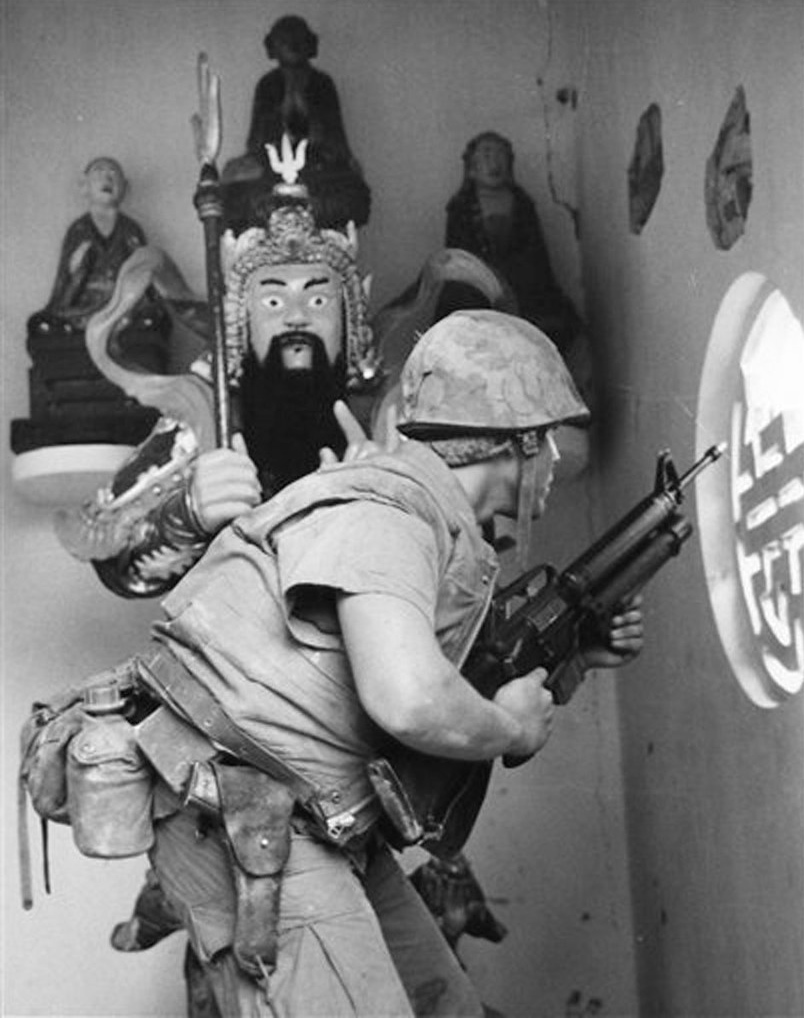
Translated into our language, what this says is that the aspect of imperialist intervention has been taking over from the civil war aspect, and it raises the question of at what point one is duty bound to decide that what began as a predominantly civil war is now predominantly a situation of imperialist invasion.
Two points about the kind of problem this is:
- A decision on this never has been and is not now our greatest priority in point of policy, since we have, right along and never more than now, rightly concentrated our practical work and attention on fighting U.S. intervention in the war; and nothing that we can decide on this point could possibly increase our antiwar activity or intensify our antiwar politics. What it would affect is only certain aspects of what we say propagandistically in the course of this antiwar activity and how we explain it. This makes it worthwhile to clarify the question without inflating its importance.
- It is no part of our problem to make a definite determination of exactly at what hour of the day one type of situation changed into another. Since the escalation was a continuum, that is both hopeless and pointless (like the classic problem of at just what instant you become “bald” if you pull your hairs out one by one, or the moment when Russia ceased to be a workers’ state.)
The meaningful problem to pose is simply this: at a given point—namely, right now—is it possible to ascertain that the nodal point of change has already been passed, and to demonstrate politically that the civil war aspect of the situation has been overshadowed or transcended?
13. The qualitative change
If it is possible to do this, it is not only because the quantitative increase in Washington’s military operations has clearly brought about the qualitative change in the war which leads one to speak of it as “America’s war.” The same picture is indicated by a social test, as distinct from simply a military criterion—a social phenomenon which has been growing in the last couple of years and which was definitively manifested by the Tet offensive.
This is the fact that the NLF has succeeded in winning such overwhelming allegiance, active or passive, from the South Vietnam population—not merely “mass support” or even majority support—as to make it difficult or impossible to consider the Saigon government even as the government of a minority section of the nation in a civil war situation. The offensive revealed it as a government clique separated from any section of the people and existing only because of the U.S.
When an “enemy” can move thousands of troops into a capital city, and organize ammunition depots and military posts, for weeks before an attack, with a whole sector of the population necessarily aware that something is going on, and without a single man, woman or child betraying the massive operation to the official government, then it is not possible to believe that a situation of “civil war” describes the state of affairs. This is a phenomenon that can occur only in the midst of a population that sees the issue as between its “own” people and an alien—as it would have done in Vichy France.
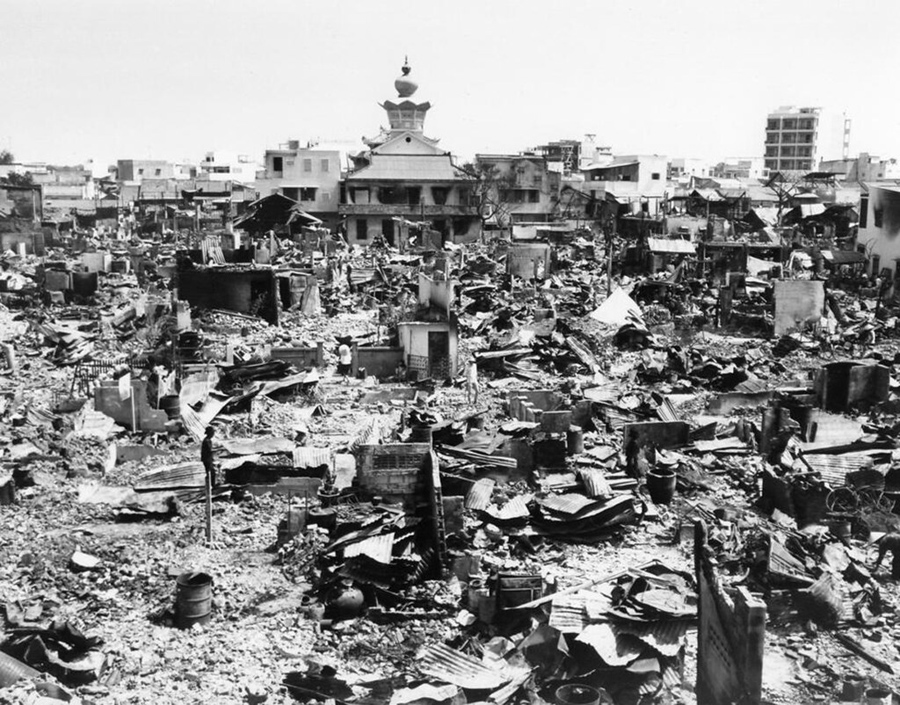
The Tet offensive revealed this; it did not bring it about; obviously a preceding stage had been marked by the phony election, for example; but in any case we are interested at this point only in ascertaining that a nodal point is being passed.
We have no need to change our political approach in any way: we need only apply it anew to what we perceive as a new stage of the Vietnam situation, the stage in which the element of American imperialist intervention has decisively overborne the civil war and now determines the nature of the war. In effect, the NLF already seems to have won political power among the South Vietnamese people. It has long been true that it enjoyed at least dual power in much of the territory; but now it appears that the other power, that of the Saigon military clique, can most accurately be viewed in the same light as the French Vichy regime in association with the German occupation. We had hoped that a revolutionary third force would arise in Vietnam before this happened; we must record that this hope seems to have been disappointed.
As the Vietnam situation moves to such a new stage, the situation tends to resemble the Cuban invasion type of situation more and more.
We are leaving some rubber in our formulation only for one reason: We do not claim to know all the facts behind the rush of events in Vietnam, particularly whether or not there are revolutionary elements left in opposition to the Saigon regime that have not gone over in despair to some degree of collaboration with the NLF; in other words, whether an upsurge of independent revolutionary elements is foreclosed or not. We do not propose any resolution about facts, especially facts we cannot know. We are not discussing past history but rather rapidly changing realities. All we can try to do is note the direction that the situation is moving in, and apply our political analysis to it. There is no need for us to try to do more.
We combat glorification of the NLF, such as is met among some Left opponents of U.S. Vietnam policy who think that opposition to American imperialism entails uncritical gilding of its victims.
If the case of the NLF is in fact being assimilated with that of the Castro regime under invasion by the U.S., then it follows that the question of military support is automatically raised, in exactly the same way we discussed in connection with Cuba.
If we decide this is definitely established, there is little that is concrete that is affected in our politics. Above all, there is not the slightest effect on our position of revolutionary political opposition to all such regimes, whatever their successes.
The victory of the NLF is a hard fact, but no one’s victory changes our political opinion of him. We remain revolutionary opponents of the NLF as of the Castro regime, and do not foster illusions about either. We combat glorification of the NLF, such as is met among some Left opponents of U.S. Vietnam policy who think that opposition to American imperialism entails uncritical gilding of its victims, and who wrong-headedly use the NLF (for example) as a symbol of the struggle for Vietnamese self-determination. Such political glorification of the NLF springs from two quite different sources: (a) Consciously pro-Communist elements who boost the NLF because it is the road to Communist power. (b) Naive, basically liberal elements who identify the NLF politically with anti-imperialism through the same uninformed ingenuousness as once promoted the line that Mao was only an agrarian reformer. They exaggerate the non-Communist side of the NLF as an argument against U.S. policy, thereby in fact conceding part of the principle to U.S. anti-Communism.
Telling the truth about the NLF now is also political preparation for the possible next stage, when the struggle against the bureaucratic collectivist regime goes to the head of the agenda.
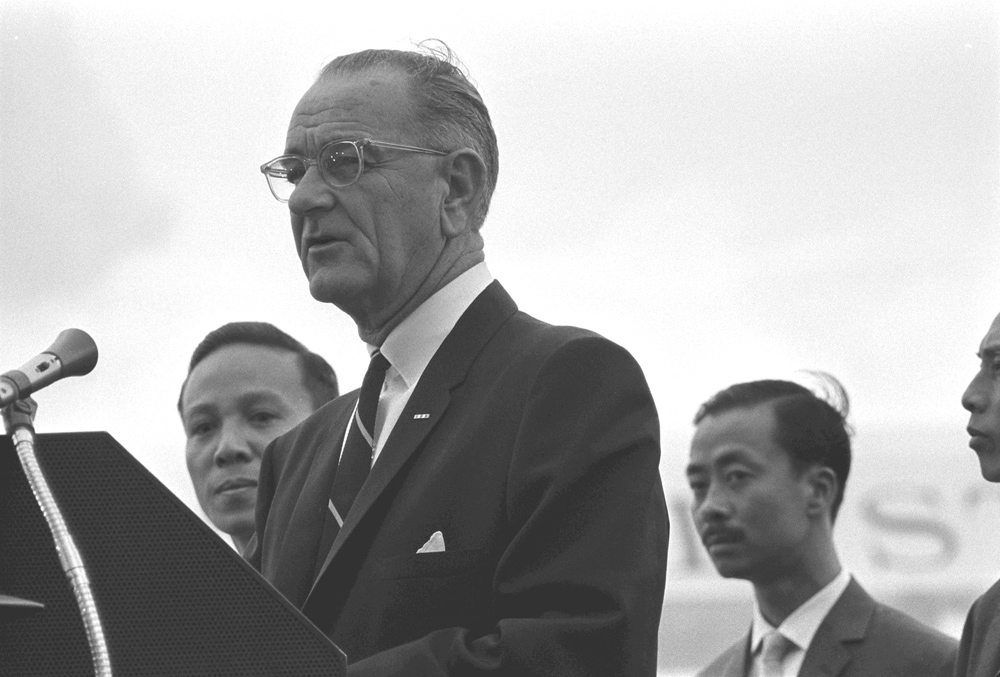
The success of the NLF in Vietnam is due not to the attractive power of Communism for the Vietnamese people but in spite of it; it is the gift of American imperialism, which once again showed that it works hand in glove with its Communist rival to convince a people that indigenous Communist domination is the lesser evil to alien domination as soon as the choice is narrowed down to these two. The Diems and Kys [Nguyen Cao Ky succeeded Diem in power] worked hard, with the help of their American patrons, to eliminate revolutionary opposition and democratic alternatives. It is the Communists who reaped the fruits of this reactionary policy.
But we have said before, in anticipation of such an eventuality, that even the definitive victory of the NLF in Vietnam would not be the End-of-the-World for the Vietnamese people, but only the beginning of a new chapter in the struggle for social freedom. There are at least three challenges visible from this point to the consolidation of the Communist power, if we assume the definitive elimination of the Americans and their clients.
(1) The consolidation crisis
Whether a postwar government takes the form of a “coalition government” or a straight NLF government (the difference between these alternatives is not sharp), the first crisis would come in a showdown between the Communist leadership and the nationalist elements who had been pushed into their arms by the imperialists.
We have no special knowledge of the forces involved and therefore cannot be confident of the result. Only, in the light of past experience, everything we do know points to the ability of the Communists vis-à-vis such elements to carry through the same kind of “salami tactics” against coalition partners as was applied in Eastern Europe, with the probable eventual consolidation of a monolithic Communist regime as soon as the partners have been digested and eliminated. Still, this leaves out the possibility, even in this stage, of a significant popular resistance to totalitarianism.
(2) National Communism
In any case, the Communist forces themselves would immediately face the problems of national relations with North Vietnam (in view of NLF pledges), China and Russia. In view of the indications that the Ho regime itself would, once relieved of military pressure, turn fully toward a national-Communist regime at least as independent as Rumania or North Korea or perhaps Yugoslavia, it is likely that a crisis with a more pro-Moscow or pro-Peking forces would not be racking. There is more of a question mark over relations between an NLF government in the South and the Ho regime in the North, with accompanying greater possibility of a crisis over such differences.
(3) The next revolution
Most important is the certain development of revolutionary opposition to Communist totalitarianism itself, if not in the immediate postwar stage, when the victors are flushed with success and national prestige, then in the stage after that. A people who have shown such extraordinary tenacity in revolutionary resistance over decades to Western imperialism will not be behind the Polish people in incubating the forces of rebellion against the new masters as against the old.
This revolutionary development can be short-circuited mainly by one thing: continued imperialist pressure from the U.S., such as will keep the people still looking to the Communists as their shield against the old world oppressors. So it was that one of Castro’s strongest bucklers against discontent at home is the degree of fear still aroused by U.S. threats; and that fear of a West German resurgence of reaction was skillfully used by the Gomulka regime in Poland to quash the dynamism of the Polish revolution of 1956. Communist power still feeds on the crimes of Western imperialism within its empire, just as U.S. reaction feeds on the crimes of the Communist world to keep its discontented bemused with its reactionary anti-Communism.
Therefore a sine qua non for any revolutionary development in the world is the curbing of American imperialism and its partners and allies; and the best inspiration that could be given to the peoples oppressed by the bureaucratic collectivist system is the revolutionary struggle and example of the masses on our side of the struggle for the world. Our immediate enemy is at home as before.
Source > Tempest
The Anti*Capitalist Resistance Editorial Board may not always agree with all of the content we repost but feel it is important to give left voices a platform and develop a space for comradely debate and disagreement.
Art Book Review Books Campism Capitalism China Climate Emergency Conservative Government Conservative Party COVID-19 Creeping Fascism Economics EcoSocialism Elections Europe Far-Right Fascism Film Film Review Fourth International France Gaza History Imperialism Iran Israel Italy Keir Starmer Labour Party Long Read Marxism Marxist Theory Migrants Palestine pandemic Protest Review Russia Solidarity Statement Trade Unionism Ukraine United States of America War Women

